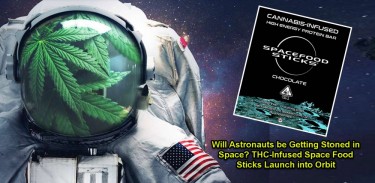
Trippin’ Planets – Scientists want to send astronauts into space with magic mushrooms
Why do scientists want to send astronauts into space with magic mushrooms?
Last year Paul Stamets, a renowned authority on mushrooms and mycology, revealed to Scientific American how he thinks magic mushrooms can help astronauts in space.
It gives a whole new meaning to the term psychonaut.
But Stamets wasn’t joking: He thinks magic mushrooms can help when astronauts start to feel the loneliness and depression of being in space for long periods of time. It’s no secret that astronauts in space experience mental disorders due to the stressors they are exposed to, combined with the exposure to equipment malfunctions, space debris, bone and muscle wasting due to microgravity, conflicts with other team members, isolation, and so much more.
It is quite common for astronauts to experience symptoms of anxiety and depression. Because of this, crew members are now being sent into space with drugs like diazepam, morphine, codeine, and even sleeping pills. Research shows that space missions can speed up the gray matter in the brain, just like what happens as you get older, but at a much faster pace. “The nature of weightlessness, ionizing radiation and psychological isolation must be better understood to make spaceflight safer for future astronauts as we venture to the Moon, Mars and beyond,” explains Robert Thrisk, former Canadian astronaut, during the opening of the Canadian Aviation and Space Museum in 2019.
For the astromycology project Stamets is involved in with NASA, he and several research teams are trying to understand how fungi may contribute to space habitat and the mental health of astronauts. “Under carefully controlled conditions, our astronauts, being able to take psilocybin into space and look at the universe and not feel distant and alone, but feel part of this vast consciousness, will give them a better frame of mind – psychologically, emotionally – working with other astronauts and staying on mission,” Stamets told Scientific American. “I believe isolation, loneliness and depression are going to be the big issues that astronauts face,” he added.
However, it will be a long time before astronauts actually take psilocybin into space. But Stamets believes it will be worth it.
“I say this with great sincerity: NASA and everyone else working and concerned with space colonization should remember that psilocybin mushrooms should be an essential part of your psychological tool kit for astronauts to overcome the loneliness and challenges of space,” Stamets said.
The importance of astronaut mental health
Of course, stable mental health is important for everyone. For astronauts, however, this is even more important because they perform and must remain high-performance jobs to complete their mission.
However, this is a gigantic task as they will have to work in extreme environments, they will be very busy and they will be far away from their loved ones. Aside from anxiety and depression, astronauts also struggle with sleep. Because of this, it is of paramount importance to keep astronauts both physically and mentally healthy so that they do not interfere with the mission. Even if the entire basis for hiring astronauts is to select people who are mentally and psychiatric stable, the kind of environment that their work puts them in is already detrimental to mental health.
Using psilocybin mushrooms in space may seem like the ultimate journey. Realistically, Stamets might be up to something; Indeed, the humble magic mushrooms have strong evidence that they can help anyone, including astronauts, keep their heads when they need them most. Of course, taking psilocybin in large amounts is not advisable there, but microdosing can help.
It’s no surprise why interest in microdosing psychedelics has surged in recent years. Ingesting large amounts of a psychedelic can increase the risk of a bad trip, although microdosing, which involves consuming tiny amounts that don’t result in hallucinogenic effects, can still show promising results.
A large study was recently conducted and the results were published in Scientific American. It showed that people who microdosed psilocybin experienced significant improvements in mental health compared to those who did not microdose. It was the largest clinical study to date analyzing microdosing of psilocybin with a control group.
“We found that microdosing psilocybin is associated with improvements in mood and mental health, adding to the growing body of research suggesting positive benefits of microdosing specifically in the areas of mental health and cognition,” explains the Study co-author Joseph Rootman. “We hope that our results will help facilitate the development of more rigorously designed clinical trials,” he adds.
Additionally, psilocybin’s ability to improve neuroplasticity and forge the birth of new neurons also holds promise for astronauts.
For now, NASA still has a zero tolerance policy when it comes to drug use of any kind. But they have a project called TRISH (Translational Research Institute for Space Health) that has focused on developing new technologies and approaches to keep astronauts healthy in space. TRISH’s primary mission is to seek and fund early-stage solutions that would help them identify drugs that would help astronauts on board space missions. it would basically mean that astronauts in space could make their own medicines.
These are fascinating developments nonetheless, but hopefully it wouldn’t be too long before NASA reconsidered the benefits of psilocybin mushrooms for their astronauts.
ASTRONAUTS AND DRUGS, READ MORE…

WILL ASTRONAUTS BRING WEED INTO SPACE AS SPACE FOOD?

Post a comment: